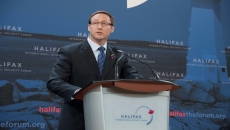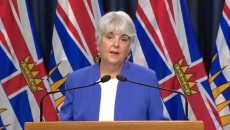The RCMP says three of the four semi-automatic weapons used by a gunman during last month's mass shooting in Nova Scotia are believed to have come from the United States. The federal force says in a news release today that only one of the guns could be traced back to a source in Canada.
The Mounties are still declining to reveal the brand or the calibre of the weapons — two handguns and two rifles — used during the April 18-19 rampage that killed 22 people in five communities around the province.
Gabriel Wortman, who police have said didn't have a licence for the weapons, was shot and killed by RCMP officers April 19 outside a gas station in Enfield, N.S.
Investigators also say they have identified the supplier of materials used to create the RCMP decals that were on the gunman's replica patrol car, and they say the decals were created without the permission of the business owner.
In addition, the RCMP says it has specialists conducting a psychological autopsy of the gunman, with the goal of gaining insight into why he committed the murders.
Regarding a series of fires set by the gunman, investigators say they believe he used an accelerant, noting he had a significant supply of gasoline at his home in Portapique.






